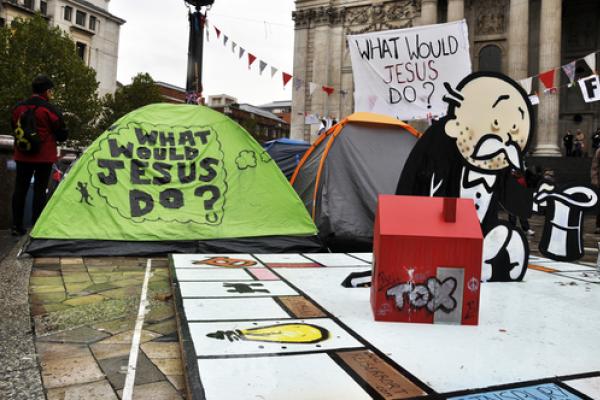While having lunch recently with Harvard Professor Robert D. Putnam, I was asked an interesting question.
Putnam is appalled at the radical lack of equality of opportunity in the U.S. today, and he wanted to know if evangelical preachers would dare to say what his pastor said when he was a teenager. Putnam told me that back then, in the midst of Martin Luther King’s great campaign against segregation, his devout Methodist pastor dared to preach that “racism is a sin.”
Professor Putnam asked me, as an evangelical, whether evangelical pastors today would be ready to declare today’s great economic inequality of opportunity a sin. That’s a great question.
In my book Fixing the Moral Deficit: A Balanced Way to Balance the Budget, I argue that the Bible does not promote equality of income or wealth. When laziness and other forms of sin result in less income, inequality is appropriate. When parents rightly pass on an inheritance of skill and wealth to children, some inequality is proper (although we certainly should keep the estate tax!). When the economic rewards of work create incentives for creativity and diligence, some inequality is desirable.
On the other hand, I believe the Bible suggests at least two limits on inequality. For one, the biblical principle of justice demands that each person and family has access to productive resources so that if they act responsibly, the can earn a decent living and be dignified members of society. Whenever the extremes of wealth and poverty make it difficult or prevent some people from having access to adequate productive resources, then that inequality is unjust, wrong, sinful, and must be corrected.
The second limitation on inequality flows from the biblical understanding of sin and power. In our broken world, whenever one group of people acquires excessive unbalanced power, they will almost always use it for their own selfish advantage.
So how should we evaluate the extreme inequality in income, wealth and power in the U.S. today?
- American economic inequality today is greater than at any time since 1928 — just before the Great Depression.
- In 2004, the richest .1 percent had more income than the poorest 120 million. If you divided the total U.S. income among 1,000 people, the richest person (one person!) would have as much income as the poorest 387!
- Between 1993 and 2007, more than half of all the increase in income in the U.S. went to the richest 1 percent. Between 2002 and 2007, 66 percent of all increased income went to the richest 1 percent. And in 2009-2010, 93 percent of all the increased income in the U.S. went to the richest 1 percent.
- The richest 1 percent of Americans own more than the bottom 90 percent.
- Over the last three decades, the average annual income of the richest 1 percent has jumped by $700,000 while the average Joe has actually lost ground.
- The poorest 20 percent had less income in 2009 than they did in 1979.
- More than 46 million Americans are in poverty.
Today there is much greater inequality and less equality of opportunity in the U.S. than in “aristocratic” Europe.
Making things even worse, some prominent politicians say that our serious budget deficits mean that we must slash effective programs that empower poor people. House Republicans have called for cutting $128 billion from food stamps; cutting Pell grants that help poor kids afford college from $5,500 to $3,000; cutting effective foreign aid that saves the lives of millions around the world. At the same time, they want to give more tax cuts to the richest Americans.
There are ways that public policy could move us away from today’s gross inequality and back toward more equality of opportunity. We should maintain effective programs that care for and empower poor people. We should spend enough on minority urban education so that everyone, not just white suburbanites, receive an education that offers vastly expanded equality of opportunity. We should increase taxes somewhat on rich Americans and tax income from dividends and capital gains at the same rate as other income. Yes, we must greatly reduce our ongoing federal budget deficit over the next five years, but we need not – and should not! – do it on the backs of the poor.
It is time for evangelical preachers to label today’s gross inequality what it is: SIN. If we believe what the Bible says about God’s concern for the poor; if we believe what the Bible says about justice; then we must denounce the gross inequality of opportunity and income in our country today as blatantly sinful.
Ron Sider is president of Evangelicals for Social Action and professor and director of the Sider Center on Ministry and Public Policy at Eastern Baptist Theological Seminary.
Got something to say about what you're reading? We value your feedback!
